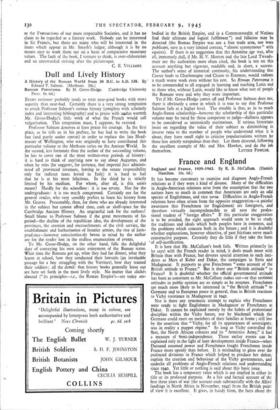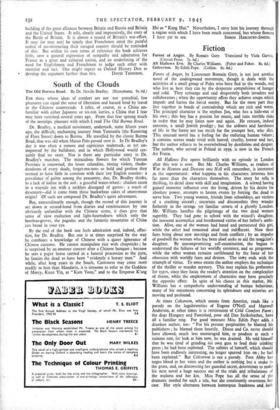France and England
England and France, 1939-1943. By R. B. McCallum. (Hamish Hamilton. 10s. 6d.)
IT has become customary to examine and diagnose Anglo-French relations as if they were a kind of disease. Many of the difficulties
in Anglo-American relations arise from the assumption that the two nations have so much in common that Americans are only an odd species of Englishman, and vice versa. Difficulties in Anglo-French relations have often arisen from the opposite exaggeration—a painful awareness that Frenchmen (or Englishmen) are foreigners, and therefore virtually incomprehensible to all save the profes sional student of foreign affairs." If this particular exaggeration is to be avoided, the right approach would seem to be to study the traditions and ideals which both peoples have in common, and the problems which concern both in the future ; and it is doubtful whether explanations, however objective of past frictions serve much constructive purpose. Certainly they do little if they take the form 'of self-justification. It is here that Mr. McCallum's book fails. Written primarily (as he says) with the French reader in mind, it deals much more with Britain than with France, but devotes special attention to such inci dents as Mers el Kebir and Dakar, the campaigns in Syria and Madagascar. It purports to give Frenchmen "some account of the British attitude to France." But is there one "British attitude" to France? It is doubtful whether the official governmental attitude has been as/consistent as Mr. McCallum makes out—or that sectional attitudes in public opinion are so simple as he assumes. Frenchmen are much more likely to be interested in "the British attitude " to Germany and to European peace in general, than in British reactions to Vichy resistance in Madagascar in 5942. Nor is there any systematic attempt to explain why Frenchmen were ready to fight Englishmen in Madagascar or Frenchmen at Dakar. It cannot be explained merely by the habits of professional discipline within the Vichy forces, nor by blackmail which the Germans could exert on members of their families at home ; still less by the .assertion that "Vichy, for all its appearances of sovereignty, was in reality a puppet regime." So long as Vichy controlled the fleet, the North African colonies and its "Armistice Army," it had a measure of lemi-independence. These earlier events can be explained only in the light of later developments inside France—when Darnand assumed power and Frenchmen fought Frenchmen inside France more openly than before. It is misleading to gloss over the profound divisions in France which helped to produce her defeat, explain the creation and behaviour of the Vichy governments, and underlie all problems of Anglo-French relations and understanding since zeeo. Yet little or nothing is said about this basic issue. The book has a temporary value which is not implied in either its title or its professed purpose. As a fair and factual account of the first three years of war (the account ends substantially with the Allied landings in North Africa in November, 5942) from the British point of view it is excellent. It gives, in handy form, the facts about the building of the great alliances between Britain and Russia and Britain and the United States. It tells, clearly and impressively, the story of the Battle of Britain. It is almost a record of Britain's war-effort. It may (or may not) be timely that Frenchmen amid the painful ordeal of reconstructing their ravaged country should be reminded of this. But within its own terms of reference the book achieves little, save a general expression of sympathy and admiration for France as a great and cultured nation, and an underlining of the need for Englishmen and Frenchmen to judge each other with restraint and tact. One might expect an Oxford History Don to • develop the argument further than this. DAVID THOAISON.























 Previous page
Previous page